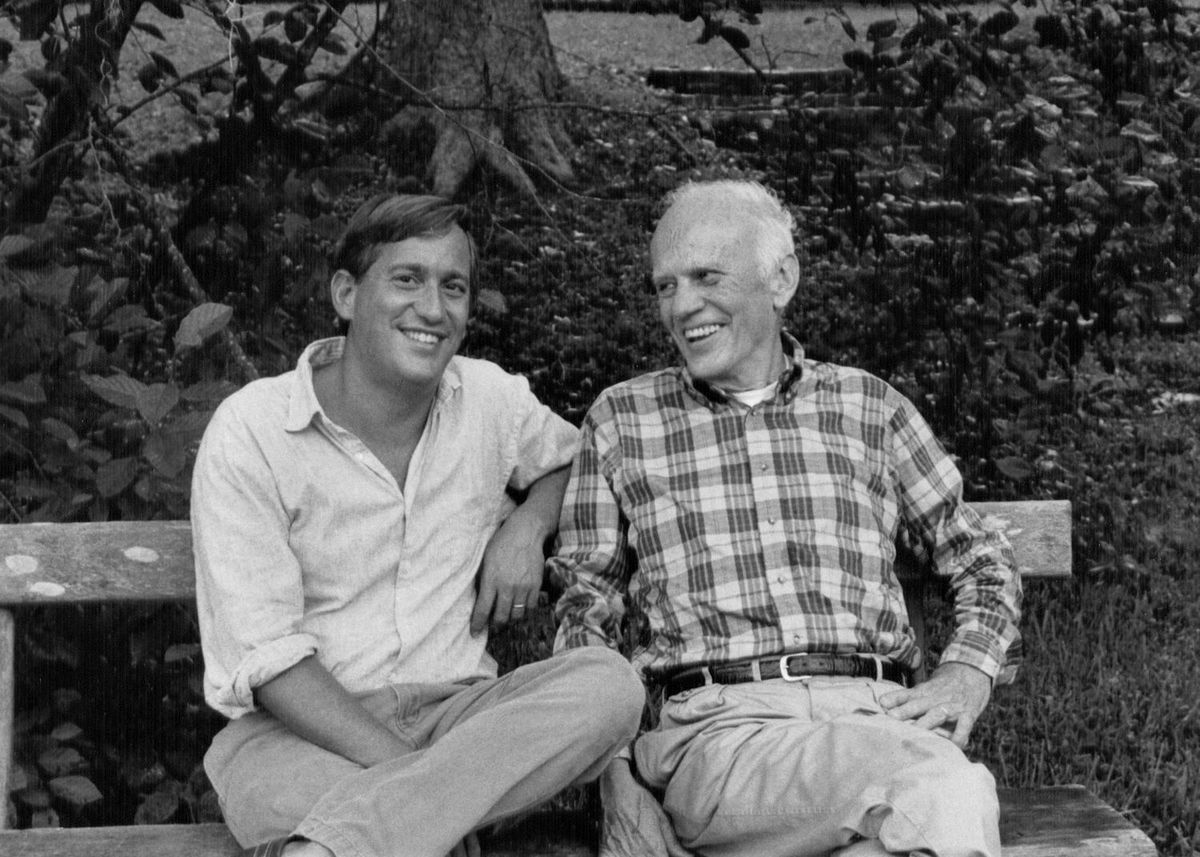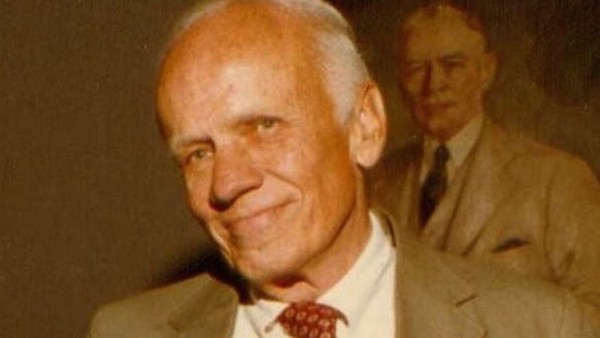There is a sort of inborn naiveté that we are never really able to shed as strangers and sojourners in this world. “[Man] is like a child who sees everything in his new world, names everything, knows everything except himself,” writes Walker Percy.[1] This is the central problem—or predicament—around which Percy builds his philosophical anthropology. “To say the least, he is bored; to say the most, he is in pure anxiety,” he contends.[2] For Percy, the only way to escape this predicament is by a profound openness to that which can only be known by faith. Thus, faith brings man into contact with the antidote he seeks. By doing so, faith saves. But if faith is the cure to man’s existential predicament—if it can cure him to the very core of his rational self—then there must be something about the nature of faith that makes it friendly, and not in opposition, to reason.
“But what is the self?” asks one of Percy’s favorite philosophers, Søren Kierkegaard. “The self is a relation that relates itself to itself or is the relation's relating itself in the relation.”[3] In the language of Husserl and the phenomenologists, we can intend things, that is, we can think about things. What is most incredible is that we can think about even ourselves. We can “relate ourselves to ourselves,” and by doing so, contemplate our own particular existence as rational selves.
Kierkegaard contends that as such multidimensional beings, we have the unique capacity to enact our own potentialities, given the freedom and self-awareness that our rational nature makes possible. We can actualize these possibilities that we might flourish as the kind of beings we are. Thus, we find ourselves governing ourselves and thereby taking self-responsibility. In taking responsibility for ourselves, we discover an interior reflexivity that permits us to know ourselves and take action for our own betterment.
But responsibility only makes sense in an inter-personal context. As such, “taking responsibility” implies taking responsibility for something to someone. It must involve, then, three irreducible aspects: the person being responsible, that which the person is being responsible for, and he whom the person is being responsible to. As such, a “self that relates itself to itself” entails a threefold—or what American philosopher C.S. Peirce calls a “triadic”—relation within the self; not like the paired—or “dyadic”—relations treated by scientific explanation.
Influenced by Kierkegaard, Walker Percy sees language as an outward expression of this internal relation. As such, he too argues that man cannot be reduced to coupled reactions between material objects.[4] For man finds himself in the act of speech constantly, “while the other creatures of earth—more than two million species—say not a word.”[5] Language is the trademark of man—of the self. Therefore, argues Percy, a theory of man should begin with language.[6]
Rationality manifests itself in language. For it involves the construction and assertion of sentences, the marriage of syntax and semantics, grammar and meaning. The assertion of a sentence, says Percy, “is a triadic event involving a coupler and the two elements of the coupled sentence.”[7] Whereas dyadic relationships involve energy exchanges between two objects (e.g. two atoms colliding) and can thus be understood in purely materialistic terms, triadic relationships entail the existence of a mind to couple the symbol with the symbolized. Letters, words—indeed, sentences—have no meaning unless meaning is given to them.
Consider the letter T, for instance. What prevents it from being merely two perpendicular lines? Why should T be associated with a particular sound and meaning? It is not necessary. It must be given. And since meaning is essentially qualitative and cannot thereby be explained materially, such signification must be conferred by an immaterial, intelligent source. Moreover, man speaks not merely in utterances of objective statements about the world outside himself. He speaks declaratively, using the word “I” to express not just facts but facts about himself. This declarative use of the word I, writes Robert Sokolowski, is not merely a sophisticated kind of noise-making: “It does not just highlight me as a voicer of sounds or a speaker of certain words. It expresses me as making a truth claim, as exercising my reason, in the sounds that I make and the words that I utter.”[8]
This steers us back into the direction of philosophical anthropology. Man is a unity of body and spirit—the self just is a union with the unique potential to relate itself to itself. He reveals this most of all when he speaks.
Man, the Castaway
Separating himself from the materialists and the Cartesian dualists, Percy counters that perhaps man is a creature who is “neither ghost nor machine.”[9] He implies the hylomorphic anthropology of Aristotle and St. Thomas Aquinas here: that the human person is a composite of matter and form, that is to say, a complete integration of body and soul into one substance without the abolition of either.
But if man is a unity so integrated, there still remains a problem highlighted by both Kierkegaard and Percy: for despite such a profound unity existing in man there is still an extraordinary tension in him that agitates to the deepest recesses of his being. We feel it to the bone, this unsettledness, and we too-easily relate to St. Paul’s lamentation in his Letter to the Romans: “I do not understand my own actions, for I do not do what I want, but I do the very thing I hate” (7:15). We know this tension subjectively. We also see evidence of it in others, in whom sin is so obvious that it remains (according to G.K. Chesterton) “the only part of Christian theology which can really be proved.”
Yet despite this all, we must face the hard fact that we have lost something that was once ours. When we break through our indifference and cast all diversions aside, we suddenly sense that something within us has been tampered with and corrupted. By thus recognizing that the origin of our anxiety is within us, and not in power, pleasure, money, honor, or any otherworldly good—and once we become clear about what we are as persons—we can then move towards a real and lasting solution. D.Q. McInerny writes,
The only reasonable explanation for this circumstance is the thesis that something has gone seriously wrong, and that consequently man’s natural state is not what it should be. If we want to understand man . . . then it is imperative that we recognize him as a creature who finds himself in a state which is considerably less than ideal. Man’s present condition is a crippled condition, and he therefore labors under burdensome handicaps as he strives to “become what he is.”[10]
Man is perpetually unsatisfied and finds no cure in this world. Percy (as a novelist-philosopher should) describes man’s existential situation by appealing to the imagination in story-like fashion. He likens man’s predicament to being shipwrecked. The island is a pleasant place, and the locals are good people; but his alienation is such that “when he should feel most at home on the island. . . he feels most homeless.”[11] Percy stretches his analogy farther. Man, he says, is like an amnesiac castaway on an island who “has lost his memory in the shipwreck and has no recollection of where he came from or who he is.”[12]
But then there is a development for the amnesiac castaway. On the shore of the mysterious island he inhabits, messages in bottles begin to wash ashore. The castaway opens the bottles and discovers messages concerning statements concerning a wide variety of topics. There are science, snippets of poetry, math equations, philosophical arguments, and news regarding the foreign island he inhabits. And some, to his delight, contain “news from across the sea.” This latter kind of news—different from all the rest—is analogous to Christian faith. Like the news from across the sea that nourishes the soul of the castaway, faith gives what every fallen human being is truly looking for. The problem is that it is just out of reach. It can only be given.
As has already been said, man is a giver and receiver of sentences. Sentences can take on different qualities, expressing different kinds of knowledge. Among these “species” of knowledge is what Percy calls “knowledge sub species aeternitatis.” Sentences affirming this kind of knowledge can be uttered by scientists, mathematicians, philosophers, historians, and even poets. They are objective statements rendered from a posture of a detached observer of reality. “Insofar as a man is objective-minded,” argues Percy, “no sentence is significant as a piece of news.”[13]
But “news” on the other hand has subjective relevance to the hearer. And there are two kinds. “Island news” informs him about his immediate circumstances concerning his local but foreign island. Ultimately, however, such news will prove impotent in providing satisfactory solutions to his deepest questions: who am I? What is my purpose?[14] To answer these sorts of inquiries, he requires something else: namely, news “from across the sea.”[15] For Percy, belief in such news is especially merited given his existential predicament. For man is a castaway and he senses it. So, what he really needs is revelation; and not a natural kind of revelation, but something beyond it. He needs divine revelation—a transcendent solution. “For Percy,” observes John Desmond, “the castaway needs the ‘good news’ of the Christian gospel, delivered by an authoritative ‘news-bearer,’ an apostle of Christ.”[16]
The Existential Necessity of Faith
Faith, then, is what man needs more than anything for his own sake. Neither natural goods, nor natural knowledge—nor even natural knowledge about supernatural goods (i.e. natural theology)—has ever been quite potent enough to solve man’s predicament. What man needs is a special assent of intellect and will enacted by grace. What he needs is faith.
Influenced by the rationalism of Hegel, Kierkegaard saw the eminence of Christian faith as an absolute paradox.[17] Faith cannot involve, for him, a rational assent. For what is believed by faith is the complete opposite of what reason moves us to expect. Faith for Kierkegaard, then, is a decisiveness rooted in subjective passion.[18] J.L. Mackie once commented that Kierkegaard’s conception of faith amounted to “a sort of intellectual Russian roulette.”[19] While this may be an exaggeration on Mackie’s part, the Danish philosopher does profess faith to be absurd in the sense of being paradoxical. He does not, however, consider it to be pure nonsense. He insists there is something powerfully surprising about the setting aside of reason in order to resolve man’s predicament. But this is precisely where Percy disagrees. For him, faith is precisely what we should expect as the solution, given our condition and given what we are.
Percy alludes to St. Thomas’s distinction between scientific knowledge and knowledge of faith. The former corresponds with knowledge sub species aeternitatis; the latter corresponds with “news from across the sea.” St. Thomas writes that “those things which are of faith surpass human reason, hence they do not come to man's knowledge, unless God reveal them.”[20] Notice what he says here: that the things which are of faith surpass human reason. Faith, then, is not infra-rational but supra-rational, constituting indeed a more perfect way of knowing. As Bishop Robert Barron says, faith lies on the far side of reason.
Revealed by God, “news from across the sea” resides in man’s intellect as truth—yes, as knowledge. Man comes to know the truth in this case, not discursively, but through grace-propelled assent. Percy agrees with St. Thomas: faith is real knowledge of man’s true and exclusive end. Departing from Kierkegaard, he concludes that there is no paradox to be had, for “one wonders simply how the castaway could be delivered in any other way.”[21]
Why Faith is Rational
What makes the belief in the “Good News” rational? Percy points us towards three canons of acceptance when it comes to faith. Since faith comes by hearing (Rom 10:17), these canons can be understood as corresponding with the following three aspects: the news giver, the news bearer, and the hearer. First, God is the news giver. He is the source of the “news from across the sea.” And he is infallible. Therefore, says Aquinas, “although the argument from authority based on human reason is the weakest, yet the argument from authority based on divine revelation is the strongest.”[22]
Second, there is the bearer of good news. Why do we believe them? Because of the gravity of the message: the news given by the Bible, the Church, the evangelist, is precisely the news we have been incessantly seeking. It is the cure to our predicament.[23] But perhaps more to the point, we believe the news bearer because he has the authority of an apostle; or because the authority grounding the evangelium he bears is derivative of the highest authority—the infallible God—who has commissioned him: “For the faith of which we are speaking, does not assent to anything, except because it is revealed by God,” says St. Thomas Aquinas.[24] Percy identifies apostolic authority as the unique strength of the Christian religion.[25] He is right; but of course, as St. Thomas says, it is the absolute sovereignty and perfect rationality of God that ultimately grounds even that which we believe as apostolic doctrine.
The third and final canon of acceptance involves the hearer. Who is the hearer? It is the alienated man in search of the supernatural knowledge—the “news from across the sea”—that will deliver him from his existential predicament: “The hearer is the castaway, not the man in the seminar, but the man who finds himself cast into the world.”[26] The hearer is the one who crosses the threshold at the far side of reason, the one who willingly submits his intellect to the supremely rational revelation of the divine Logos. Indeed, there is nothing else—no argument, no aesthetic, no experiment, no created person—that accomplishes what faith does. Without faith, man remains at the mercy of despair; he remains a castaway, an alien. Faith, therefore, is reasonable—and supremely so—because it provides man with exactly what he wants, needs, seeks, and is made for, that he might flourish as the God-imaging rational animal he is. Through Christian faith, man receives the best explanation to all his deepest questions—and more.
Man is a triadic unity of body, intellect, and will. In Kierkegaardian terms, he is a relation precisely as a unity of relations. Yet, despite this, he is not perfectly one with himself nor the God who is his ultimate origin and end. He finds himself to be restless, like a castaway who longs for his home across the sea. But for Percy, the cardinal problem of man’s alienation ultimately points towards its solution: the revelation of God through reason and, finally and pre-eminently, through faith. So, only by a radical openness to the transcendent will man ever escape from his existential predicament. Faith remains the sole antidote, the lone balm that soothes man’s broken soul and restores it to life. And in the final analysis, faith proves not to be a departure from reason—but a perfection of it.
[1] Walker Percy, “The Delta Factor,” in The Message in the Bottle (New York: Picador, 2000), 9.
[2] Walker Percy, “The Man on the Train,” in The Message in the Bottle, 84.
[3] Søren Kierkegaard, The Sickness Unto Death (Princeton: PUP, 1980), 13.
[4] Percy, “A Triadic Theory of Meaning,” in The Message in the Bottle, 161-162.
[5] Percy, “The Delta Factor,” in The Message in the Bottle, 13.
[6] Ibid., 7.
[7] Percy, “A Triadic Theory of Meaning,” in The Message in the Bottle, 167.
[8] Robert Sokolowski, Phenomenology of the Human Person (Cambridge, UK: CUP, 2008), 13.
[9] Percy, “The Delta Factor,” in The Message in the Bottle, 44.
[10] D.Q. McInerny, Philosophical Anthropology (Elmhurst Township: The Priestly Fraternity of Saint Peter, 2016), 315.
[11] Percy, “The Message in the Bottle,” in The Message in the Bottle, 143.
[12] Ibid., 119.
[13] Ibid., 129.
[14] Ibid., 143.
[15] Ibid., 144.
[16] John F. Desmond, Fyodor Dostoevsky, Walker Percy, and the Age of Suicide, (Washington, D.C.: The Catholic University of America Press, 2019), 93.
[17] Percy, “The Message in the Bottle,” in The Message in the Bottle, 144-145.
[18] William McDonald, "Søren Kierkegaard", The Stanford Encyclopedia of Philosophy (Winter 2017 Edition), ed. Edward N. Zalta, https://plato.stanford.edu/.
[19] J.L. Mackie, The Miracle of Theism, (New York: Oxford University Press, 1982), 216.
[20] Thomas Aquinas, Summa theologiae, II-II, q.6, a.1, eds. Benzinger Brothers, trans. Fathers of the English Dominican Province, at The Thomistic Institute, www.aquinas101.thomisticinsitute.org.
[21] Percy, “The Message in the Bottle,” in The Message in the Bottle, 146.
[22] St. Thomas Aquinas, Summa theologiae, I-I, q.1, a.8.
[23] Percy, “The Message in the Bottle,” in The Message in the Bottle, 147.
[24] St. Thomas Aquinas, Summa theologiae, II-II, q.1, a.1.
[25] Percy, “The Message in the Bottle,” in The Message in the Bottle, 148.
[26] Ibid., 148.


